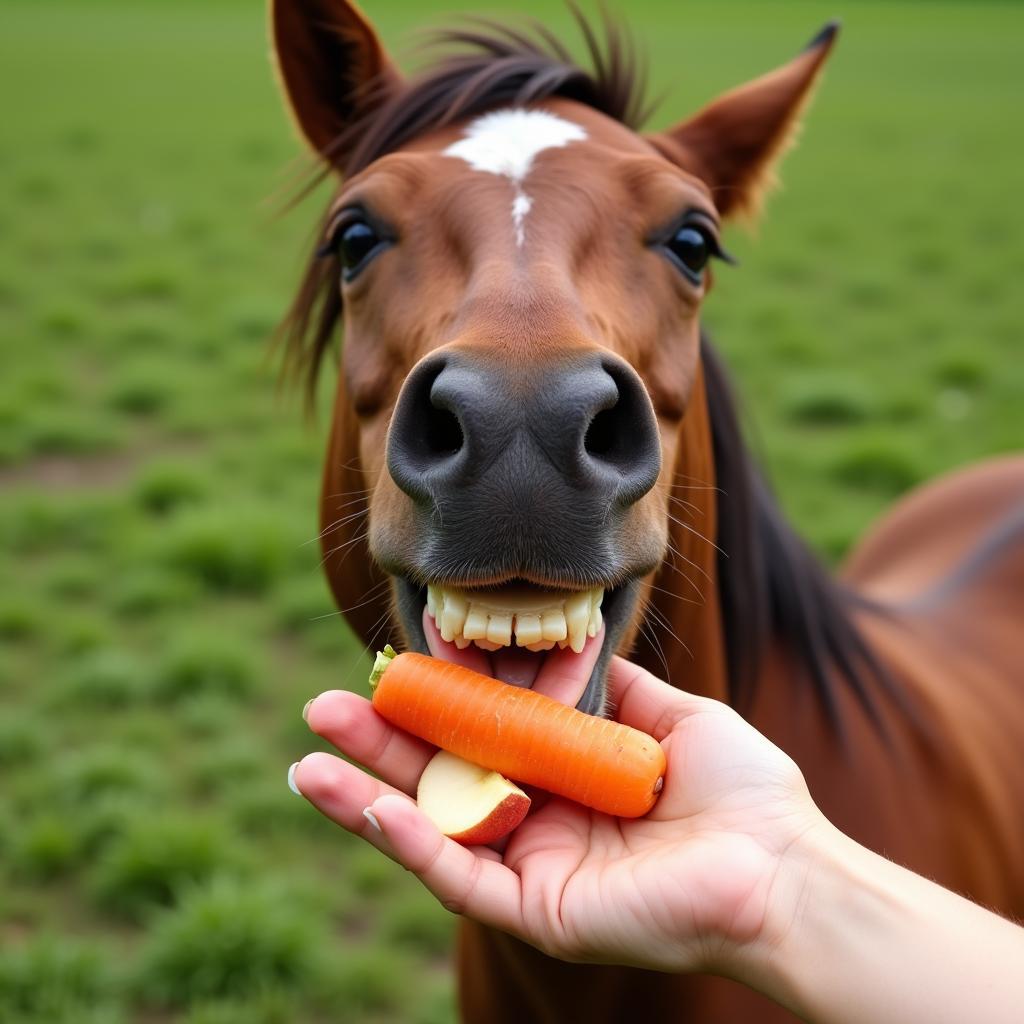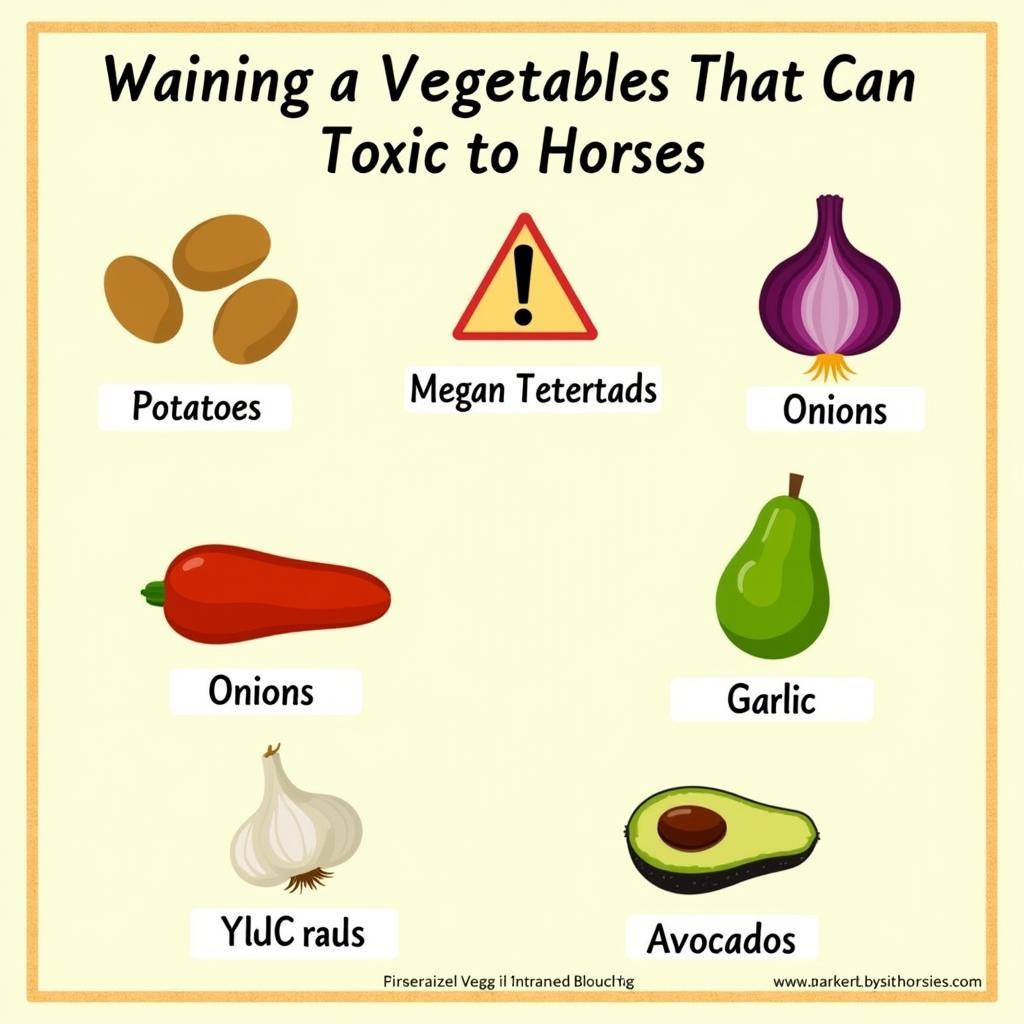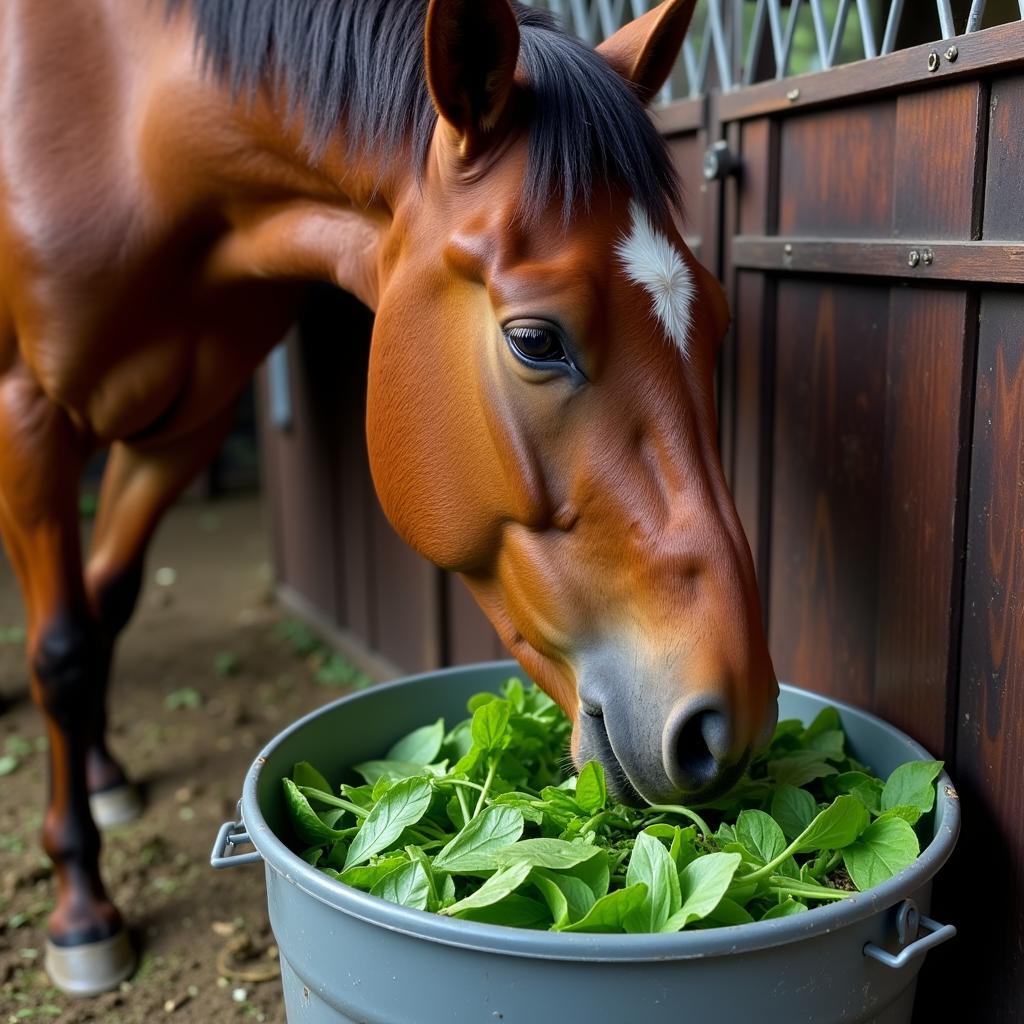Knowing What Veg Can Horses Eat is crucial for maintaining their health and happiness. Horses, like all animals, have specific dietary needs. While they primarily graze on grass and hay, adding certain vegetables can provide essential vitamins, minerals, and variety to their diet. This comprehensive guide will explore the safe and nutritious vegetable options for your equine companion, along with potential risks and best practices.
Safe and Nutritious Vegetables for Horses
Several vegetables are safe and healthy for horses, offering a range of nutritional benefits. These include:
- Carrots: A classic favorite, carrots are rich in vitamin A and provide a good source of fiber.
- Apples: Apples are a tasty treat packed with antioxidants and vitamins. Remove the core and seeds before feeding.
- Celery: This crunchy vegetable is a good source of potassium and fiber.
- Pumpkin: Pumpkin is rich in vitamin A and provides a good source of fiber. It can also be helpful for horses with digestive issues.
- Squash (Butternut, Zucchini): These versatile squashes are excellent sources of vitamins and minerals.
 Horse Enjoying Carrots and Apples
Horse Enjoying Carrots and Apples
Remember to introduce new vegetables gradually to avoid digestive upset. Start with small quantities and observe your horse for any adverse reactions.
Vegetables to Avoid Feeding Your Horse
While many vegetables are beneficial, some can be harmful or even toxic to horses. It’s essential to be aware of these and avoid them completely. These include:
- Potatoes: Raw potatoes contain solanine, a toxic compound that can be harmful to horses.
- Onions and Garlic: These members of the allium family can damage red blood cells and lead to anemia.
- Avocados: Avocados contain persin, a toxin that can cause colic and other digestive problems.
- Stone Fruits (Peaches, Plums, Cherries): The pits of these fruits contain cyanide, which is highly toxic.
 Vegetables Harmful to Horses
Vegetables Harmful to Horses
Always consult with your veterinarian if you are unsure about a particular vegetable.
What Veg Can Horses Eat: Portion Control and Preparation
Even with safe vegetables, moderation is key. Overfeeding can lead to digestive problems such as colic or laminitis. Offer vegetables as treats or supplements, not as a primary food source.
- Washing: Thoroughly wash all vegetables to remove any dirt, pesticides, or other contaminants.
- Chopping: Cut larger vegetables into smaller, bite-sized pieces to prevent choking hazards.
- Quantity: Offer vegetables in small quantities, no more than a few cups per day.
Can Horses Eat Leafy Greens?
Leafy greens like lettuce and spinach can be given to horses in moderation. However, they offer limited nutritional value compared to other vegetables. Large quantities can also lead to digestive upset.
 Horse Eating Leafy Greens
Horse Eating Leafy Greens
Conclusion: A Balanced Diet for a Healthy Horse
Understanding what veg can horses eat is an essential part of responsible horse ownership. By offering a variety of safe and nutritious vegetables in moderation, you can enhance your horse’s diet and overall well-being. Remember always to prioritize good quality hay and grass as the foundation of their nutrition. By following the guidelines in this article, you can ensure your horse enjoys a healthy and balanced diet.
FAQ
- What are the best vegetables for horses? Carrots, apples, and celery are excellent choices.
- Can horses eat tomatoes? Ripe tomatoes are generally safe in small quantities, but avoid green tomatoes and stems.
- How many vegetables can I give my horse per day? A few cups total is a reasonable amount.
- What should I do if my horse has an adverse reaction to a vegetable? Contact your veterinarian immediately.
- Can horses eat cooked vegetables? It’s best to feed vegetables raw to preserve their nutrients.
- Are there any vegetables that can help with specific health conditions in horses? Pumpkin can be beneficial for digestive health.
- Should I consult with a veterinarian before introducing new vegetables to my horse’s diet? It’s always a good idea to consult with your veterinarian, especially if your horse has any underlying health conditions.
Common Scenarios
- Scenario 1: Your horse has been experiencing mild colic. You might want to consider adding pumpkin to their diet to aid digestion.
- Scenario 2: You want to provide your horse with a healthy treat. Carrots and apples are great options.
- Scenario 3: You’re unsure whether a specific vegetable is safe for your horse. Always consult your veterinarian.
Further Reading
For more information on horse care and nutrition, visit our website for articles on feeding, grooming, and training.
Need help? Contact us at Phone Number: 0772127271, Email: [email protected] Or visit our address: QGM2+WX2, Vị Trung, Vị Thuỷ, Hậu Giang, Việt Nam. We have a 24/7 customer service team.